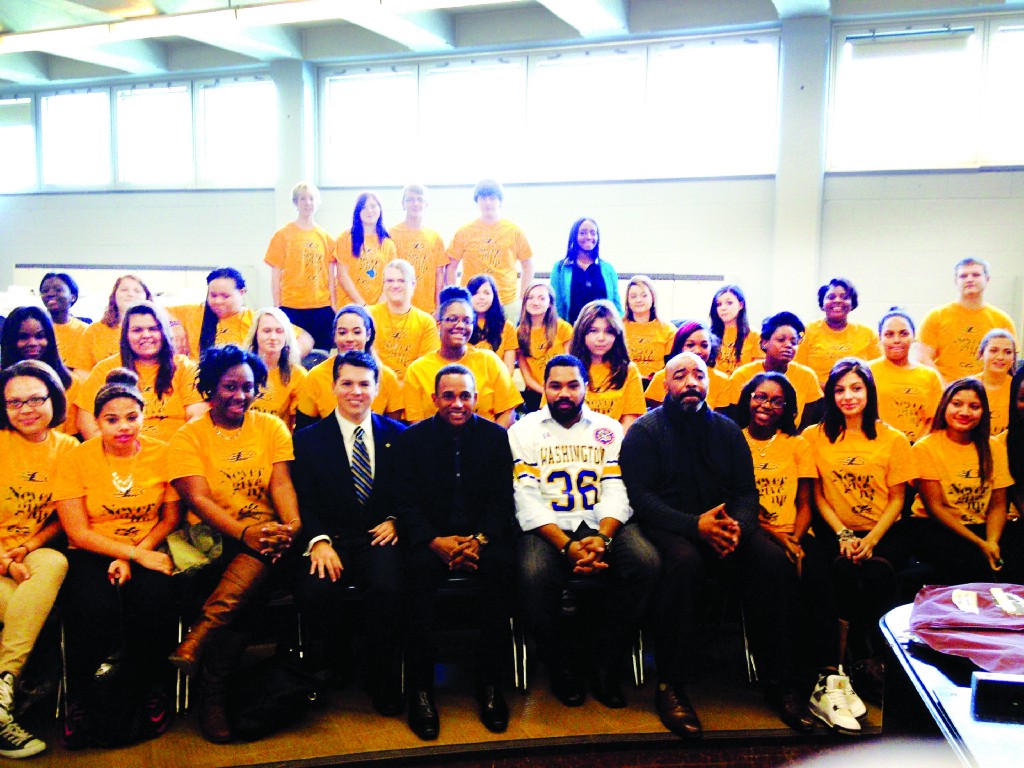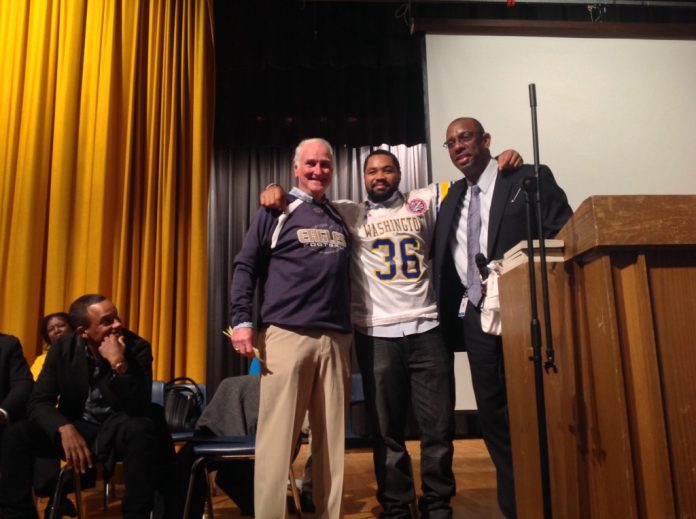Welcome home: George Washington football coach Ron Cohen (left) and school principal Gene Jones present filmmaker (and 2002 GW graduate) Tommy Oliver with his old high school football jersey. Oliver came back for a talk with the student body regarding his new film, “1982.” Sitting at left is Hill Harper, the star of the film. ED MORRONE / TIMES PHOTO
Tommy Oliver may have moved on from Philadelphia to an exciting career as a feature filmmaker, but that didn’t stop his high school alma mater from giving him a Hollywood homecoming.
On Oct. 25, George Washington High School invited one of its own back home to honor him for the success of 1982, Oliver’s feature film debut that follows a character named Tim Brown (played by Hill Harper of CSI: NY fame), a man attempting to shield his young daughter from her mother’s crippling drug addiction.
The film was shot on the block where Oliver grew up in West Oak Lane and is a semi-autobiographical account of his own mother’s crack addiction. Instead of letting the drugs and crime surrounding him swallow him up, Oliver concentrated on his schoolwork at Washington, where he was a football player under longtime coach Ron Cohen. 1982 also features known actors such as Wayne Brady, Quinton Aaron (The Blind Side) and Academy Award nominee Ruby Dee (American Gangster) and has been well-received at film festivals in Toronto and Paris.
Oliver came back to address Washington’s entire student body, letting the jam-packed auditorium know that no dream is unattainable, no matter how impossible it may seem as a teenager.
“There are so many good things happening at this school, and that’s part of what makes your high school experience, finding your own niche,” Oliver said. “I’m from the ‘hood, and I wanted to get out. I never touched a drug in my life, because I saw what it could do to a family. I just did whatever I needed to do to get where I wanted to be. It could have gone differently, but I wouldn’t let it.”
Oliver’s success at Washington led him to enroll at Pittsburgh’s prestigious Carnegie Mellon University, and the young filmmaker hasn’t looked back since. He helped produce shorts and documentaries following college, but 1982 was his first big break. He shot the film entirely on location in his old neighborhood, wanting the authenticity of the setting to come across to viewers.
Judging by the success the film and Oliver have had — he was recently signed by the Creative Artists Agency, the top entertainment talent agency in the world — o far, so good.
“It’s an honor for me to be here to celebrate my friend Tommy Oliver,” said Harper, on hand with Oliver to help promote the film. “We shot it literally in the house he grew up in, which was a first for me in my career. If you think about it, he was sitting in these same seats as all of you, with similar obstacles to overcome. In 10 years, he’s gone from that to being repped by CAA and being recruited to direct big-budget films. No matter what you dream, it can be manifested. You can create the life you want for yourself. Tommy Oliver is an example of that.”
Washington not only got to welcome Oliver back home, but the school got a surprise when Harper pledged to write a check to fund computers and books for a new school library. Principal Gene Jones vowed to name the library in Harper’s honor.
The visit was an uplifting one for a school like Washington, like many in the district, that are struggling with funding and morale due to all the cutbacks brought on by the massive deficit the district is facing. For kids who think they aren’t getting a fair shake at success, hearing firsthand from Oliver that anything was possible was something they needed to hear.
But success, he told them, will not just be handed to them.
“People want success without the hard work but frankly, you have to be ready to work your (butt) off,” he said. “The opportunity will come so long as you make yourself ready for it. My mother was addicted from the time I was 4 years old, and I cried myself to sleep many nights.
“What you do today will affect what goes on the rest of your life. It’s about getting yourself away from those bad influences that weigh you down. Follow what you love and always be prepared.”
State Rep. Brendan Boyle, on hand for the event, backed up Oliver’s message to the crowd. Boyle himself grew up in Olney and has turned an upbringing in a troubled neighborhood to a career as a successful young politician helping constituents on a statewide level.
“Where you start doesn’t matter,” Boyle said. “It’s where you finish that counts. What Tommy said about hard work, that’s absolutely true. You see his film, but what you didn’t see is the hours and hours he put in just to get one scene right. You can’t let people tell you no. It’s your life, not theirs. That’s 99 percent of what determines a person’s success.”
Cohen, who has seen his share of high-profile graduates start within Washington’s football program, concurred with Boyle.
“It’s never the size of the person, it’s the size of their heart,” Cohen said after presenting Oliver with his old №36 football jersey. “Tommy didn’t always start, but his attitude made him a very good player, which he’s taken into his career as a filmmaker.”
Oliver readily acknowledged that he was a much better director than he ever was a football player, but that’s OK. Some are athletes, while some gravitate toward art or student council. What matters most, Oliver said, is that everyone be a dreamer no matter the dream.
“I read a book here by Frederick Douglass when I was in 11th grade, and that book taught me that I’d rather be hated for who I am than to be loved for someone I am not,” he said. “Be true to yourself. Don’t change, just be you.” ••

George Washington helped welcome filmmaker Tommy Oliver back to his alma mater with a special assembly in which he was presented with his old №36 football jersey. To Oliver’s left are State Rep. Brendan Boyle and Hill Harper, who stars in Oliver’s debut film, 1982.





